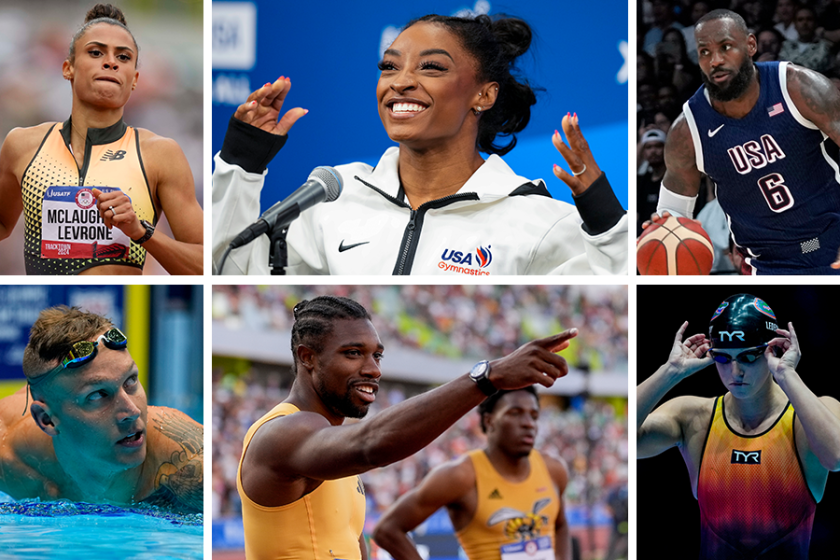Q&A: Learn how Olympians keep their cool from Team USA’s chief sports psychologist

Your morning jog or weekly basketball game may not take place on an Olympic stage, but you can use Team USA’s techniques to get the most out of your exercise routine.
It’s not all about strength and speed. Mental fitness can be just as important as physical fitness.
That’s why the U.S. Olympic & Paralympic Committee created a psychological services squad to support the mental health and mental performance of athletes representing the Stars and Stripes.
“I think happy, healthy athletes are going to perform at their best, so that’s what we’re striving for,” said Jessica Bartley, senior director of the 15-member unit.
Bartley studied sports psychology and mental health after an injury ended her soccer career. She joined the USOPC in 2020 and is now in Paris with Team USA’s 592 competitors, who range in age from 16 to 59.
Bartley spoke with The Times about how her crew keeps Olympic athletes in top psychological shape, and what the rest of us can learn from them. Her comments have been edited for length and clarity.
Why is exercise good for mental health?
It gets you moving. It gets the endorphins going. And there’s often a lot of social aspects that are really helpful.
There are a number of sports that stretch your brain in ways that can be really, really valuable. You’re thinking about hand-eye coordination, or you’re thinking about strategy. It can improve memory, concentration, even critical thinking.
What’s the best way to get in the zone when it’s time to compete?
When I work with athletes, I like to understand what their zone is. If a 0 or a 1 is you’re totally chilled out and a 10 is you’re jumping around, where do you need to be? What’s your number?
People will say, “I’m at a 10 and I need to be at an 8 or a 7.” So we’ll talk about ways of bringing it down, whether it’s taking a deep breath, listening to relaxing music, or talking to your coach. Or there’s times when people say they need to be more amped up. That’s when you see somebody hitting their chest, or jumping up and down.
The 2024 Paris Olympics start this week, and 594 athletes will be competing for the United States. Here’s how you can watch and stream any of 329 events.
If you make a mistake in the middle of a competition, how do you move on instead of dwelling on it?
I often teach athletes a reset routine. I played goalie, so I had a lot of time to think after getting scored on. I would undo my goalie gloves and put them back on, which to me was a reset. I would also wear an extra hairband on my wrist, and when I would snap it, that meant I needed to get out of my head.
It’s not just a physical reset — it helps with a mental reset. If you do the same thing every single time, it goes through the same neural pathway to where it’s going to reset the brain. That can be really impactful.
Do Olympic athletes have to deal with burnout?
Oh, yeah. Everybody has a day where they don’t want to do whatever it is. That’s when you have to ask, “What’s in my best interests? Do I need a recovery day, or do I really need to get in the pool, or get in the gym?”
Sometimes you really do need what we like to refer to as a mental health day.
How can you psych yourself up for a workout when you just aren’t feeling it?
It’s really helpful to think about why you’re doing this and why you’re pushing yourself. Do you have goals related to an activity or sport? Is there something tied to values around hard work or discipline, loyalty or dependability?
When you don’t want to get in the gym, when you don’t want to go for a run, think about something bigger. Tie it back to values.
When Olympians and journalists dine on the bounty of France in the coming weeks, some of what’s on their plates will have been grown, gardened and harvested from Parisian garages, road medians and rooftops.
Is sleep important for maintaining mental health?
Yes! We started doing mental health screens with athletes before the Tokyo Games. We asked about depression, anxiety, disordered eating and body image, drugs and alcohol, and sleep. Sleep was actually our No. 1 issue. It’s been a huge initiative for us.
How much sleep should we be getting?
It’s different for everyone, but generally we know seven to nine hours of sleep is good. Sometimes some of these athletes need 10 hours.
I highly recommend as much sleep as you need. If you didn’t get enough sleep, napping can be really valuable.
Is napping just for Olympic athletes or is it good for everybody?
Everybody! Naps are amazing.
What if there’s no time for a nap?
There are different ways of recharging. Naps could be one of them, but maybe you just need to get off your feet for 20 minutes. Maybe you need to do a meditation or mindfulness exercise and just close your eyes for five minutes.
The Yurchenko double pike has become Simone Biles’ signature move in the vault, a gravity-defying, six-second burst that has added to her legend.
How do you minimize the effects of jet lag?
We try to shift one hour per day. That’s the standard way of doing it. If you can, it’s super helpful. But it’s not always possible.
The thing we tell athletes is that our bodies are incredible, and you will even things out if you can get back on schedule. One or two nights of crummy sleep is not going to impact your overall performance.
What advice do you give athletes who have trouble falling asleep the night before a competition?
You don’t want to change much right before a competition, so I usually direct athletes to do what they would normally do.
Do you need to unwind by reading a book? Do you need to talk on the phone with somebody and get your mind off things? Can you put your mind in a really restful place and think about things that are really relaxing?
One of the paradoxes of sleep is that the more we fixate on getting it, the less likely we are to achieve it.
Are there any mindfulness or meditation exercises that you find helpful?
There are some athletes who benefit greatly from an hourlong meditation. I love something quick, something to reset my brain, maybe close my eyes for a minute.
If I’m feeling like I need to take a moment, I love mindful eating. You savor a bite and go, “Oh, my gosh, I have not been fully engaged with my senses today.” Or you could take a mindful walk and take in the sights, the smells, all of the things that are around you.
What do you eat when you need a quick nutrition boost?
Cashews. I tend to carry those with me. They’ve got enough energy to make sure I keep going, physically.
I’ve always got gummy bears on me too. There’s no nutritional value but they keep me going mentally. I’m a big proponent of both.
There’s a lot riding on Americans’ food choices, including trillions of dollars in spending and our collective risk of developing a slew of chronic diseases. A new survey shows what we want to eat, and why.
Is it OK to be superstitious in sports?
It depends how flexible you are. Maybe you put on your socks or shoes a certain way, or listen to certain music. Routines are really soothing. They set your brain up for success in a particular performance. It can be really, really helpful.
But I’ve also seen an athlete forget their lucky underwear or their lucky socks, and they’re all out of sorts. So your routine has to be flexible enough that you’re not going to completely fall apart if you don’t do it exactly.
Are Olympians made of stronger psychological stuff than the rest of us?
Not necessarily. There are some who don’t get feathers ruffled and have a high tolerance for the fanfare. There’s also a lot of regular human beings who just happen to be fantastic at a particular activity.











